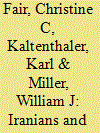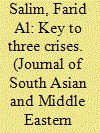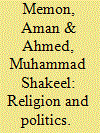| Srl | Item |
| 1 |
ID:
124253


|
|
|
|
|
| Publication |
2013.
|
| Summary/Abstract |
Since the end of the cold war over two decades ago, the world has withnessed fundamental transformation at many lavels in the international system. These changes were revolutionary. "One could argue that six revolutions are dominating in what we called the long twenty first century. Starting in 1989, the revolution in international affairs, the revolution in economics affairs, the revolution in technological affairs, the revolution in societal affairs, the regulation revolution and finally the revolution in military affairs."
|
|
|
|
|
|
|
|
|
|
|
|
|
|
|
|
| 2 |
ID:
124252


|
|
|
|
|
| Publication |
2013.
|
| Summary/Abstract |
A 2008 poll of Iranians revealed that approximately twenty-four percent of those surveyed support the development nuclear weapons by Iran, while seventy-four percent of those surveyed support the development of exclusively peaceful nuclear capabilities. This essay develops an argument that explains why Iranians hold different views on nuclear weapons. We contend that the elite discourse on the legitimacy of nuclear weapons within a nation will play a very large role in shaping public attitudes on the development of such weapons. In post-revolution Iran, ruling elites have invoked Islam to shape the discourse on nuclear weapons, and top clerics have argued that Islam forbids the development of such weapons. Thus we would expect that acceptance or rejection of this view of nuclear weapons will be the primary factor explaining an Iranian's support for or opposition to their development. Our regression analyses indicate that a respondent's views on whether Islam tolerates the development of nuclear weapons explain, in large measure, the observed variation in Iranian support for developing nuclear weapons.
|
|
|
|
|
|
|
|
|
|
|
|
|
|
|
|
| 3 |
ID:
124255


|
|
|
|
|
| Publication |
2013.
|
| Summary/Abstract |
Palestine occupied an exceptional place in German strategic thinking long before Hitler's rise to power, indeed before his birth. Ashkenazi Jews from Germany and Poland established a small religious community in Jerusalem around 1800. They lived in abject poverty, supported by contributions from fellow Jews in Europe, and devoted all of their time to religious study.
|
|
|
|
|
|
|
|
|
|
|
|
|
|
|
|
| 4 |
ID:
124254


|
|
|
|
|
| Publication |
2013.
|
| Summary/Abstract |
According to instrumentalist theorists, political conflicts very offen emerged as a sequal to socio-economic and political inequalities "in and between the nations". Conversely, they do not recognise " religions, traditons and cosmologies" as the genuine cause of political conflicts despite the views, the instrumentalists do accept the reality of politicazing religious traditions and radicalization of religious communities by the politicians for political gains particularly in the times of economic decay, social disintegration or or state collapse."
|
|
|
|
|
|
|
|
|
|
|
|
|
|
|
|